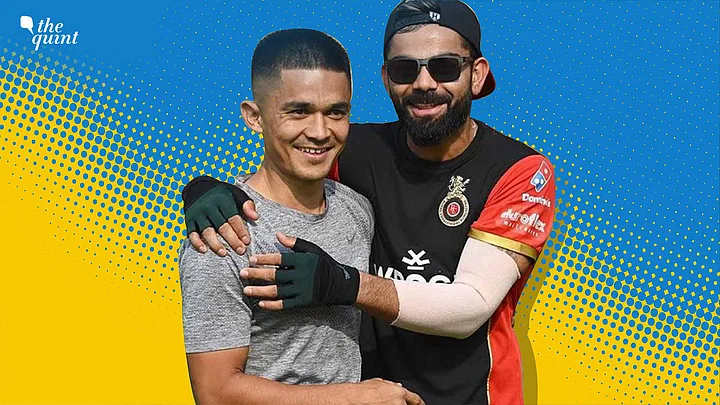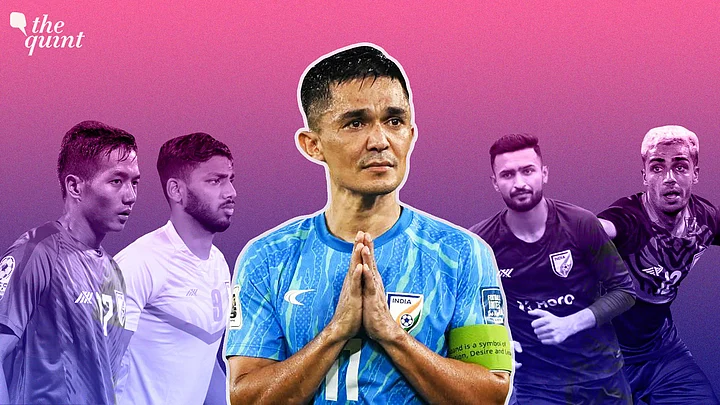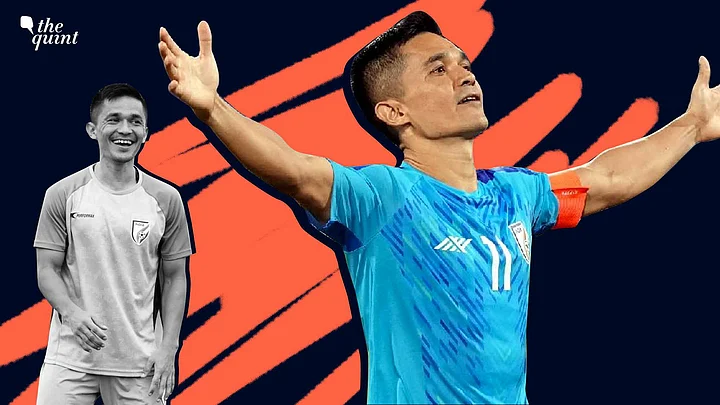Exactly a month ago on this date – 6 June 2024 – Sunil Chhetri played his last match for the Indian football team. Widely celebrated as the greatest footballer to have ever graced this nation – certainly, should we consider statistics – Chhetri drew curtains on a stellar 19-year career, which saw him making 146 appearances and scoring 93 goals. His swan song was a 0-0 draw against Kuwait in Kolkata.
What has happened in Indian football since Chhetri’s retirement?
The team agonisingly missed out on qualification to the 2026 FIFA World Cup third round qualifiers, followed by the dismissal of coach Igor Stimac, and the subsequent storm of controversies.
But how has Sunil Chhetri – India’s all-time leading goal-scorer – been keeping up?
During a bona fide conversation with The Quint, Chhetri, who now has had the time and opportunity to reflect on his career, shared heartfelt reflections on his illustrious career – from his journey in Indian football to the challenges he had faced along the way, the times he cried but no one knew, and the friendships he made – most notably with Indian cricketer Virat Kohli.
Here are the excerpts:
It has been a month since your last match in the Indian blue. How has the past month been? Have you made peace with the realisation that you will never represent India again?
Thank you for reminding me again (laughs). I think what has helped is that I have my family around me. My mum, dad and my wife and kid are with me. So the majority of my time, when I'm not sleeping, is spent occupied in the nicest way possible. So I think I haven't had that time alone to think deeply, that I can never play for the country again. I am quite at peace with the decision. A small part of me will always keep fighting, will always keep nagging, especially when the camp is announced, when the national team’s matches come along. But slowly, I think it will fade away. I'll make peace with it. Right now, it is fresh. So whenever I do have time, I think about it. But it's nothing serious because when I did make the decision, I thought about it. It wasn't a decision that I made in haste. So, I would say I am majorly in peace.
Now that you have had the time to reflect on your career, one characteristic trait we feel played a role in elevating your stature is your knack for embracing challenges. You joined Bengaluru FC at a time when it seemed joining Churchill Brothers was the much safer option, because football was not particularly popular in Karnataka. You have also played abroad by ditching the comfort and stardom back home. Do you think this trait set you apart from others?
It is true, apart from the last line – it hasn't set me apart from everyone else. It has definitely given me a lot of color. Right from when I was young, when I left Delhi, that was not a choice. That was by default. Getting an opportunity to play for Mohun Bagan was something that I never dreamt of. But right after that, going to JCT, coming back to East Bengal, then going to Dempo, coming back to Mohun Bagan again, going abroad, coming back and taking Prayag United at one point in my career – you can say that I have often taken routes which were not explored before, but it was not to prove anyone wrong or right. It wasn't to set myself apart, but just what I felt at that moment. My army background helps me not be scared of taking different cultures and different places, because it's not easy. I can assure you that changing the dressing room is not easy, changing the whole system of culture is not easy. From Kolkata to JCT is a different ball game. From JCT to Panjim is different, and from Panjim to Kansas City is completely different. So, it was more to do with the kind of person I am. It wasn't to prove any point. It wasn't a predetermined thought that I was going to be the changemaker. It was just that's the way I am. We live once. So I travel as much as I can and see different cultures and different people. Whenever those opportunities come in, more than often I've been positive about taking that plunge.
One might assume that your career was always adorned with flowers, but it had its fair share of thorns. You could not sign for the English club Queens Park Rangers owing to the denial of a work permit. You went for a trial at Coventry City, but their erstwhile manager Chris Coleman said you were not good enough. How did you deal with these setbacks?
Don’t mince his words (laughs). His words were “You're way behind the standards we have here. Your technique is all right, but you have no clue what was happening in training.” And I will tell you, a small part of me was annoyed and sad that I didn't make it, but a big part of me was happy that I was going back home. I was called for 15 days but East Bengal allowed me to go for only four days. And out of the four days, the first day we had shooting training where I was absolutely brilliant and the next three days were 4v4 training, where I got absolutely battered on a rainy, cold January time in England. And I was crying. I had no clue what was happening. The pace of the game was something that I had never seen, felt, or even heard of. Bhaichung (Bhutia) bhai did warn me, but when I went there, I saw the level was crazy. But you know what, in hindsight, it helped me when I went to Phoenix for trials for Kansas, or when I went to Sporting Clube de Portugal or QPR, because it made me more aware of what their level was. It showed me that their level was too high, and I had to be that much prepared. When I went to Coventry, I just thought that I was the best in India. I'll go there and I'll nail it. But I got battered for three days in the rainy, soggy conditions in Coventry. Manager Chris Coleman didn't mince his word. He practically told me, you are not good enough. Get back to your home and try and train more.
Do you think that in hindsight, the Coventry City stint might have made you a better footballer by destroying any egoistic baggage that you were carrying? Because later in your career, you went to Sporting Clube de Portugal where you had to train with teenagers despite being in your mid-20s, and you did not have any problems whatsoever.
The ego emerges when you actually have some kind of feeling that you're better than the others. When I was thrown from the A team of Sporting and asked to train with the B team, I saw that there were players like Bruma and Eric Dyer, all 17, 18, 19 years old. You can't have an ego because you do understand that those players are better than you. I think it was more of a humbling experience. I was at peace knowing that I was a 16-23 squad member, I knew I had to work hard to even be on the bench. I only played five games for Sporting B, and that too, not more than 45 minutes in a single game. So there was no way that I was going to have any ego. But you are right. I think somewhere in my head, because I've been to all these places, I never thought a huge amount of deal for myself. No matter what I've achieved, no matter how many good days I've seen. Probably this is the reason why I always stay – I wouldn't say humble, but grounded – because I know what I've seen. There are so many players who are better than me. So yeah, I'm just fortunate to be born in India.
We asked Indian football fans about who the next Sunil Chhetri could be, and the overwhelming answer was that India would never produce another Chhetri. Do you think it is high time our strikers demand a role as a striker in their Indian Super League clubs, because every team plays foreigners in that position?
There are two things at play here. Firstly, I believe that my relationship with the fans is not only on the pitch, but also off the pitch, and that has happened because of the longevity of my career. It is because of the number of years I have played. So for anyone to reach anywhere close – and I promise you they will – it will take time.
Now coming to the second point. I completely agree that they should play as strikes. I've encouraged all of our young strikers to at least go and challenge, and show that you are good enough. When you do get a game and you prove that you are good enough, the coach doesn't care about your nationality. The club doesn't care. They want to win games. They do not care whether it's a Manvir Singh or a Jorge Pereyra Diaz scoring the goals. They don't care whether it's a Roy Krishna or a Rahim Ali. They will not care. You get them goals, you get them what they want and they will play you. No club or coach cares about which nationality the striker is from. They just want to win games. For example, last to last year. Roy Krishna and Sunil Chhetri both sat on the bench, but a certain Sivasakthi Narayanan played all the games for Bengaluru FC. Now, who would have thought that before the season started? Roy sat out some games, then I sat out some games, but Siva played all the games. I always tell the young strikers that go and challenge. At least tell the coaches that you want to play as number nine. Of course, if it doesn't happen in due time, you can always think about going left or right, but at least go and challenge. As difficult as the number nine position is, it is the most important and most fulfilling position. You change the fate of a team. We all train really hard to defend, but scoring is a very, very important aspect. England is one of the favourites in Euros, but their second-highest score is Bukayo Saka with only a few goals. The highest goal-scorer is Harry Kane with some 60-odd goals. So they need Harry Kane, no matter how good these guys like Saka and Phil Foden are.
.jpg?auto=format%2Ccompress&fmt=webp&width=720)
You share a lot of similarities with another Indian sporting legend, that is Virat Kohli. Both of you have had to deal with numerous challenges, we can associate words like ‘Captain, Leader, Legend’ with both of you, and also, you guys are great foodies who had to sacrifice the love for food to attain what you did. Tell us about this friendship.
I think this started when we met at an event long back, and we kept in touch. Initially, it was just ‘How are you doing?’, ‘Happy Diwali’ and ‘Happy Holi,’ but over the last six or seven years, we have been very close. By close I don’t mean that we talk every day, but close enough to understand each other. It's very amazing when you have a superstar like him, with whom you can share something, and then he will text you back saying ‘You know what? I understand that.’ Because very few will. When I want to share some stuff, I tell it to him and vice versa, because we know that we will understand each other. And him being a thorough gentleman, and a completely crazy and funny person really helps. Not many people understand or know this, but he is really funny. He can crack anyone up. He is very witty and funny. He is a good human being. I wish nothing but all the very best to him and his lovely family. As you said, we do share a lot of similarities. We got married at the same time. We were blessed with being a parent at almost the same time. We have a lot of similar things to talk about, but food remains the top priority that we talk about.
(At The Quint, we question everything. Play an active role in shaping our journalism by becoming a member today.)


